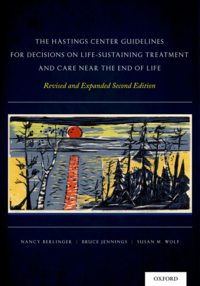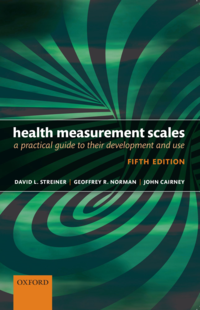STAT!Ref is pleased to announce the availability of two new resources added in Medical Ethics called The Hastings Center Guidelines for Decisions on Life-Sustaining Treatment and Care Near the End of Life and Health Measurement Scales: A practical guide to their development and use.
The Hastings Center Guidelines for Decisions on Life-Sustaining Treatment and Care Near the End of Life updates and significantly expands The Hastings Center's 1987 Guidelines on the Termination of Life-Sustaining Treatment and Care of the Dying. Like its predecessor, this second edition will shape the ethical and legal framework for decision-making on treatment and end-of-life care in the United States.
This groundbreaking work incorporates 25 years of research and innovation in clinical care, law, and policy. It is written for physicians, nurses, and other health care professionals and is structured for easy reference in difficult clinical situations. It supports the work of clinical ethicists, ethics committee members, health lawyers, clinical educators, scholars, and policymakers. It includes extensive practical recommendations.
Health care reform places a new set of challenges on decision-making and care near the end of life. The Hastings Center Guidelines for Decisions on Life-Sustaining Treatment and Care Near the End of Life is an essential resource.
Overview:
- Clarifies the current ethical and legal framework for treatment decision-making and end-of-life care in the U.S.
- Structured for ease of reference
- Provides comprehensive guidelines and commentary on pediatric and adult decision-making, with step-by-step processes and clear explanations
- Offers recommendations and models for effective communication in care planning, decision-making, care transitions, and conflict management, as well as concerning specific interventions
- Promotes clinician education and systemic improvements by describing the goals of good care for seriously ill patients and the skills, knowledge, and systems needed to support good care
- Describes the social context of decision-making, helping professionals to understand how choices may be shaped by family, religion and culture, care settings, law, and financing
- Includes unique perspectives from disability communities to promote better understanding of the experience of disability as a factor in treatment decision-making
- Includes a discussion guide on resource allocation and the cost of care
- Includes selected bibliography of more than 500 print and online resources
Bundle this resource with Oxford Textbook of Palliative Medicine, Oxford Textbook of Palliative Nursing and Ethical Decision-Making in Nursing and Health Care.
Clinicians and those in health sciences are frequently called upon to measure subjective states such as attitudes, feelings, quality of life, educational achievement and aptitude, and learning style in their patients. This fifth edition of Health Measurement Scales enables these groups to both develop scales to measure non-tangible health outcomes, and better evaluate and differentiate between existing tools.
Health Measurement Scales is the ultimate guide to developing and validating measurement scales that are to be used in the health sciences. The resource covers how the individual items are developed; various biases that can affect responses (e.g. social desirability, yea-saying, framing); various response options; how to select the best items in the set; how to combine them into a scale; and finally how to determine the reliability and validity of the scale. It concludes with a discussion of ethical issues that may be encountered, and guidelines for reporting the results of the scale development process.
Appendices include a comprehensive guide to finding existing scales, and a brief introduction to exploratory and confirmatory factor analysis, making this resource a must-read for any practitioner dealing with this kind of data.
Overview:
- Topics presented in the order that scales are constructed
- Assumes minimal knowledge of statistics
- Written in a conversational tone
- Readers can use these steps to construct their own scales
Although the target audience is health researchers, the resource is appropriate not just for researchers, but also for graduate students. The authors are well regarded and their resource is a staple on the bookshelves of many researchers interested in measurement of subjective states, attitudes, etc.
Bundle this resource with Measurement in Nursing and Health Research, Advanced Assessment: Interpreting Findings and Formulating Differential Diagnoses and Introduction to Epidemiology.
Have any questions about these new resources? Please call 800-901-5494 or fill out this form to speak with a STAT!Ref Team Member today.

